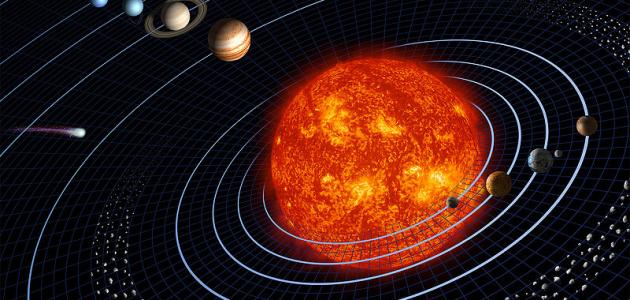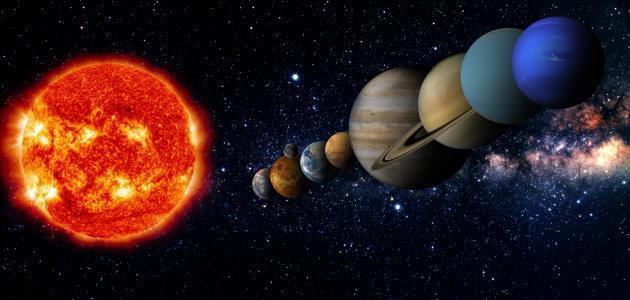astronomy
Astronomy is defined as the scientific study of celestial bodies such as planets, stars, comets, and galaxies, in addition to all phenomena that arise outside the Earth’s atmosphere, such as cosmic background radiation. Astronomy is one of the oldest sciences. Existing, which also concerned other sciences such as chemistry, the movement of celestial bodies, the evolution and composition of the universe, meteorology, and others.
Astronomy was mainly concerned until the invention of the telescope, and the discovery of the laws of motion and gravity in the seventeenth century in observing and predicting the positions of the planets, the moon, and the sun in order to know the days of the year, and achieve astronomical purposes, and later on navigation and scientific interests, and astronomy expanded later to include many Fields such as astrophysics, the study of gas molecules around and between stars, and despite this expansion and progress achieved by astronomy, it is still subject to many major limitations such as being essentially an observational system and not an experimental science, which means the existence of many problems such as the inability To control various elements such as temperature, chemical composition, or pressure, in addition to making all measurements at long distances from the studied objects.
branches of astronomy
Specialized astronomy has been divided into two main branches since the twentieth century, which are observational astronomy, which is concerned with obtaining data and analyzing them using basic physics principles, and theoretical astronomy, which is concerned with developing models. Analytical or computational, with the aim of describing astronomical objects and phenomena, and these two branches are considered complementary to each other, as theoretical astronomy is concerned with explaining the observational results, and the observations that were used to confirm the theoretical results.
Read also:What are the planets of the solar system?Classification of subfields of astronomy
Astronomy is divided into many sub-fields of study, including the following:
- solar astronomy: Scientists in this field are interested in studying the sun, understanding how it changes, and its impact on the Earth. They also use both terrestrial and space tools to conduct studies related to the stars. These scientists are called solar physicists.
- stellar astronomy: Stellar astronomy studies stars, how they form, evolve, and die, observing them in all wavelengths, and then applying the resulting information to create physical models of them.
- Planetary astronomy: Scientists in this field study planets inside or outside the solar system, in addition to studying many other bodies such as comets and asteroids.
- galaxy flag: Galactic scientists study all objects and phenomena in the Milky Way Galaxy, in addition to studying its movement and evolution, with the aim of knowing how galaxies form.
- Cosmology: Cosmology is defined as the science that studies the entire universe, its origin, and its evolution since the moment of the Big Bang.
- Extragalactic astronomy: Extragalactic astronomy studies how other galaxies form, disintegrate, and move, merge, and change.
- Astrometrics: Astrometry is the oldest astronomical field, which is concerned with measurements of the sun, moon, and planets, which helped scientists in other fields predict several events such as eclipses and eclipses, and build models related to the formation and evolution of stars and planets.
The importance of astronomy
Astronomy is one of the few scientific fields that interact directly with society, and among the fields in which this science benefits are the following:
Read also:When is the sun's rays useful?- Industry: Astronomy is involved in many areas of industry such as advances in imaging and communications, for example radio astronomy has provided a rich wealth of instrumentation, useful tools, and data processing methods.
- energy: Astronomy has obvious importance in the field of energy. For example, astronomical methods may be used to find fossil fuels, or assess the possibility of new sources of renewable energy. Technology designed to image X-rays is used in X-ray telescopes to monitor plasma fusion.
- International cooperation: Technological and scientific achievements are one of the great competitive advantages between countries, which gives them pride in having the latest technologies necessary to achieve new scientific discoveries. Astronomy is an appropriate field for international cooperation because of the need to use telescopes around the world to see the whole sky, and the high cost of building astronomical observatories on Earth and in space. , which necessitates the participation of several countries in owning it, and one of the most prominent examples of these partnerships is the European Southern Observatory located in Chile, which included 14 European countries in addition to Brazil.
- Medicine: Astronomy informs many issues specific to the medical fields. For example, the use of small thermal sensors in heating neonatal units, which were originally developed to control the temperature of a telescope instrument, is an example of direct applications of astronomical instruments in medicine.
- Astronomy in everyday life: Astronomy is useful in many aspects of daily life, including the following:
- Climate study: Satellites are used to monitor daily weather patterns, storm patterns and severe weather such as monsoons, wildfires, droughts, and other life-threatening patterns.
- Travel advances: Attempts to reach space have benefited in the advancement of means of travel. For example, aircraft engineers have benefited from the learning of space exploration in preventing icing on planes at high altitudes.
- Mobile phones: Astronomy has benefited from creating the fastest, newest and best technology for smartphones, which will not work without the presence of satellites whose increase around the Earth reduces the possibility of not being able to receive cellular communications at any point.
- GPS: Astronomy was used to determine global locations, for example, the global positioning system (GPS), which relies on satellites, was developed.









